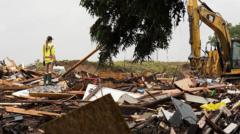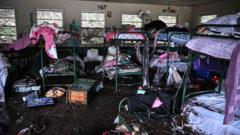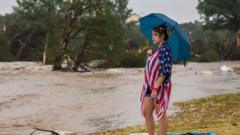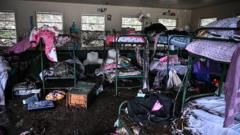Following catastrophic flooding across central Texas that has claimed at least 79 lives, including 21 children, search and rescue operations continue amid concerns over staffing shortages at the National Weather Service. The climate crisis is exacerbating extreme weather events, intensifying the state's ongoing struggles with severe rain and flash floods.
Catastrophic Flooding in Texas Claims Lives and Sparks Concerns Over Emergency Response

Catastrophic Flooding in Texas Claims Lives and Sparks Concerns Over Emergency Response
Severe rainfall leads to the tragic loss of 79 lives, including children, as Texas grapples with unprecedented flash floods, prompting questions about emergency management capabilities.
In a devastating turn of events, Texas faced catastrophic flooding yesterday, resulting in the deaths of 79 individuals, among them 21 children. Search and rescue operations are currently underway, with hundreds of volunteers scouring the flooded regions around the Guadalupe River. The ongoing effort has become increasingly urgent as authorities reported that at least 22 deceased victims, including four children, remain unidentified.
The flooding coincided with a severe rainstorm that began late Thursday night, prompting flash-flood warnings just before midnight. By early Friday morning, officials issued desperate pleas for residents and campers in the area to seek higher ground immediately, as the Guadalupe River surged 22 feet (approximately 6 meters) within a mere three hours. The impact has been felt particularly hard at Camp Mystic, a girls’ summer camp where eleven campers and one counselor were reported missing as around 750 girls attended this week.
As rescue operations progressed, questions arose regarding the adequacy of emergency responses, highlighted by vacant positions in crucial local weather offices. Experts voiced concerns that these staffing shortages may have hindered timely coordination between the National Weather Service and local emergency managers, worsening the flood's impact.
High rainfall events akin to this disaster are becoming an alarming trend globally, with studies linking such phenomena to climate change driven by fossil fuel emissions. As the world grapples with the implications of these changes, Texas's recent tragedy serves as a stark reminder of the urgent need for improved emergency preparedness and climate action.






















